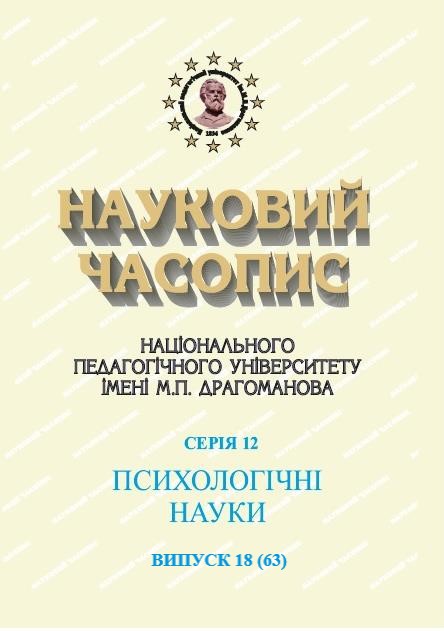THE INFLUENCE OF SIBLING POSITION ON SATISFACTION OF MARITAL RELATIONSHIPS IN YOUNG FAMILIES
DOI:
https://doi.org/10.31392/NPU-nc.series12.2021.18(63).06Keywords:
parental family, behavior, siblings, marriage, complementarity, sibling position, marital relations, compatibility, adaptation, marital satisfaction.Abstract
The article discusses the peculiarities of marital relationships in young families. Foreign and domestic studies on the problem of marital relations are analyzed, in particular, the influence of sibling position on the level of marital satisfaction. The psychological meaning of the sibling position concept is revealed. Peculiarities of complementary, partially complementary and non-complementary marriages according to the sibling position are characterized. It is noted that the complementarity of marriage allows a person to integrate the positive experience of interaction with siblings in their family life. According to Spearman’s rank correlation, a statistically significant positive relationship was found between the birth order in the family with the child’s ego-state (r=0.467; p=0.002), satisfaction with the couple's relationship (r=0.899; p=0.0001). The relationship between the birth order in the family with the ego-state of the father (r=-0.784; p=0.0001), satisfaction of the relationship with sibling (r=-0.675; p=0.0001), is not statistically significant. It has been found that in complementary marriages most respondents have a close relationship with their siblings, and in non-complementary couples a relationship with a sibling is unsatisfactory. Experiencing an unsatisfactory relationship with a sibling, they subconsciously choose a partner to live with another sibling position, thus trying not to reproduce the scenario of the relationship that was in the family of their parents. The ego-state of the father is more pronounced in older children than in younger children. The younger ones often develop the ego-state of the child. Satisfaction with the relationship between the couple in relation to the partner and himself is higher in younger children. Satisfaction with sibling is higher in older children. It was stated that complementary marriages are more satisfied with their marital relations, relationships with siblings, the functions performed by partners are similar to those they performed in the family of their parents. It is noted that the development of an appropriate psycho-correctional program, taking into account the sibling position of each spouse, will help stabilize marital relations in young families.
References
- Adler, A. (1997). Ponjat prirodu cheloveka [Understand human nature]. Moscow : Akademicheskij proekt [in Russian].
- Boujen, M. (2005). O processah differenciacii svoego «Ja» v roditelskoj sem’ Teorija semejnyh sistem Mjurreja Boujena: osnovnye ponjatija, metody i klinicheskaja praktika [About the processes of differentiation of one’s “I” in the parental family. Murray Bowen Family Systems Theory: Basic Concepts, Methods and Clinical Practice]. Moscow : Kogito-Centr, 81–106 [in Russian].
- Vitek, K. (1988). Problemy supruzheskogo blagopoluchija [Problems of marital well-being]. Moscow : Progress [in Russian].
- Grozdova, E., & Liders, A. (1997). Komplementarnost suprugov i udovletvorennost brakom [Complementarity of spouses and satisfaction with marriage]. Semejnaja psihologija i semejnaja terapija: Ezhekvartalnyj nauchno-prakticheskij zhurnal – Family psychology and family therapy: Quarterly scientific and practical journal, 2, 23–31 [in Russian].
- Kottler, Dzh. (2001). Psihoterapevticheskoe konsultirovanie [Psychotherapeutic counseling]. Saint Petersburg : Piter [in Russian].
- Kratohvil, S. (2009). Psihoterapija semejno-seksualnyh disgarmonij [Psychotherapy of family and sexual disharmony]. Saint Petersburg : Rech [in Russian].
- Mushkevich, M., Fedorenko, R., Magdisjuk, L., & Duchiminska, T. (2018). Psihologija molodoi simji: monografija [Psychology young family: monograph]. Luck : Vezha-Druk [in Ukrainian].
- Obozov, N.N. (1990). Psihologija mezhlichnostnyh otnoshenij [Psychology of interpersonal relationships]. Kyiv : Lybid [in Russian].
- Olifirovich, N.I. (2007). Psihologija semejnyh krizisov [The Psychology of Family Crises]. Saint Petersburg : Rech [in Russian].
- Osodlo, V. (2017). Problema siblinhovykh stosunkiv u psykholohii simji: vporiadkuvannia naukovoho dyskursu [The problem of siblings in psychology: streamlining scientific discourse]. Visnyk Natsionalnoi akademii Derzhavnoi prykordonnoi sluzhby Ukrainy. Seriia: Psykholohiia –Bulletin of the National Academy of the State Border Service of Ukraine. Series: Psychology, 1. Retrieved from http://nbuv.gov.ua/UJRN/Vnadpn_2017_1_8 [in Ukrainian].
- Rodzhers, K. (2002). Psihologija supruzheskih otnoshenij. Vozmozhnye alternativy [Psychology of marital relations. Possible alternatives]. Moscow : ESMO [in Russian].
- Sysenko, V.A. (1989). Supruzheskie konflikty [Spousal conflicts]. Moscow: Mysl [in Russian].
- Yushchenko, Ya.I. (2013). Komplementarnist ta funktsionalno-rolova uzghodzhenist podruzhzhia yak chynnyky zadovolennosti shliubom [Complementarity and functional-role coordination of spouses as factors of marriage satisfaction]. Aktualni problemy psykholohii. Zbirnyk naukovykh prats Instytutu psykholohii imeni H.S. Kostiuka NAPN Ukrainy. Psykhofiziolohiia. Psykholohiia pratsi. Eksperymentalna psykholohiia – Actual problems of psychology. Collection of scientific works of the Institute of Psychology named after H.S. Kostyuk of the National Academy of Sciences of Ukraine. Psychophysiology. Psychology of work. Experimental psychology, 5(13), 313–319 [in Ukrainian].
- Ewin Smith, T. (1990). Academic achievement and teaching younger siblings. Social Psychology Quarterly, 53(4), 352–362.
- Howe, N., & Rinaldi, C. (2004). You be the big sister’: maternal-preschooler internal state discourse, perspective-taking, and sibling caretaking. Infant and Child Development, 13, 217–234.
- Sokal, L., & Piotrowski, C. (2011). My Brother’s Teacher? Siblings and Literacy. Education Research International, 253896. https://doi.org/10.1155/2011/253896
- Toman, W. (1961). Family constellation of normal and disturbed marriages. Journal of Ind. Psychol, 17, 93–95.

